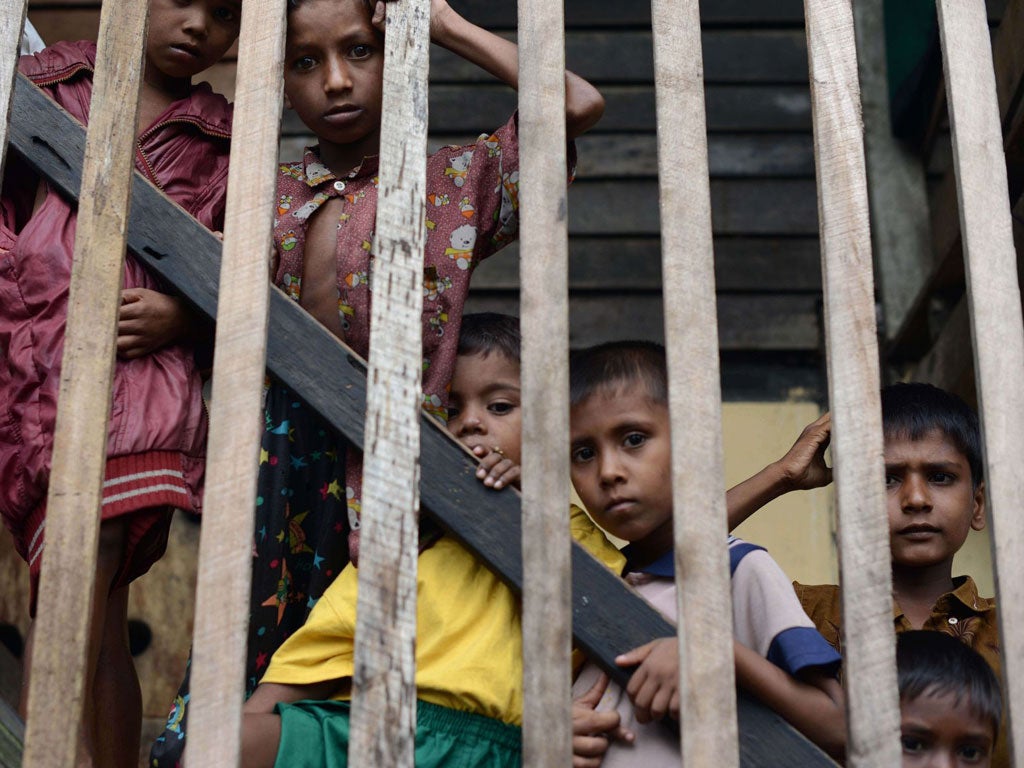Outbreak of ethnic violence claims 100 lives in Burma's west
Aung San Suu Kyi and others accused of failing to speak out against persecution

Your support helps us to tell the story
From reproductive rights to climate change to Big Tech, The Independent is on the ground when the story is developing. Whether it's investigating the financials of Elon Musk's pro-Trump PAC or producing our latest documentary, 'The A Word', which shines a light on the American women fighting for reproductive rights, we know how important it is to parse out the facts from the messaging.
At such a critical moment in US history, we need reporters on the ground. Your donation allows us to keep sending journalists to speak to both sides of the story.
The Independent is trusted by Americans across the entire political spectrum. And unlike many other quality news outlets, we choose not to lock Americans out of our reporting and analysis with paywalls. We believe quality journalism should be available to everyone, paid for by those who can afford it.
Your support makes all the difference.A new wave of ethnic violence in the west of Burma has claimed the lives of more than 100 people, and the government in Rangoon has warned that the turmoil could threaten the country’s reputation.
Earlier this summer, clashes between Muslim and Buddhist communities in Rakhine state left about 90 people dead and forced up to 75,000 from their homes. Most of those who fled this summer are still living in refugee camps. Violence erupted again earlier this week after more than 2,000 homes were set alight.
“The government is causing problems, the [Buddhist] Burmans are being encouraged to kill us, the Rohingya,” one Muslim resident, Mohammed Yayaha, told The Independent by telephone from Pauktaw township, where a village was reportedly burned down today. “The government is also trying to kill us.”
Win Myaing, a spokesman for the Rakhine state government, told reporters that 112 people had now died and a further 72 were injured, among them 10 children. The minority Rohingya community have suffered discrimination and oppression for decades. Many Burmese consider them “Bengalis” despite their having lived in Burma for centuries.
A number of the country’s most celebrated rights campaigners – including the opposition leader Aung San Suu Kyi – have been criticised for either failing to speak out more forcibly about the persecution of the Rohingya or for siding with those who want to expel them from the country.
Earlier this month, Buddhist monks marched through Rangoon in protest at efforts by the Organisation of Islamic Co-operation to establish a permanent office in the city to help the country’s Muslim communities. The proposal was subsequently rejected by President Thein Sein, who has also said he believes the Rohingya should leave Burma.
In a disturbing new development, Chris Lewa, a co-ordinator at the Arakan Project, an advocacy group monitoring the Rohingya situation in the region, said other Muslim communities in Rakhine, particularly the Kaman, were also now being targeted. She said that unlike in the summer when the clashes were triggered by the alleged rape of a Buddhist woman by Rohingya men, it was unclear what was responsible for the latest violence.
“I think this is the next step of the plan to expel the Rohingya. [The authorities] have managed to get them from Sittwe [the regional capital]. Now, wherever they are in a minority, they are trying to get them out,” she said.
This week, the UN Secretary General, Ban Ki-moon, issued a statement describing the latest violence as “deeply troubling” and calling on the Burmese authorities to act to end the lawlessness. “The vigilante attacks, targeted threats and extremist rhetoric must be stopped,” he said. “If this is not done, the fabric of social order could be irreparably damaged and the reform and opening up process being currently pursued by the government is likely to be jeopardised.”
Yet in a sign of how the violence in the west of Burma is having a ripple effect elsewhere, the Rangoon-based Burmese Muslim Association said it was cancelling Eid celebrations, both out of solidarity with the Rohingya and because of concerns over safety.
According to the Associated Press, a statement released by the president and printed in a local newspaper said: “The army, police, and authorities in co-operation with local people will try to restore peace and stability and will take legal action against any individual or organisation that is trying to instigate the unrest.”
Join our commenting forum
Join thought-provoking conversations, follow other Independent readers and see their replies
Comments